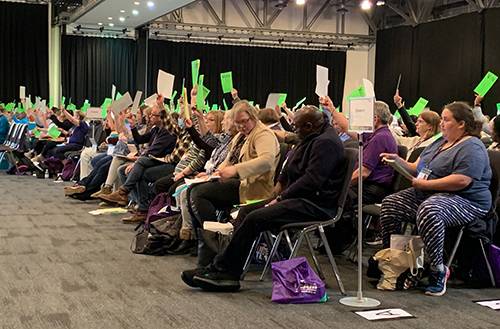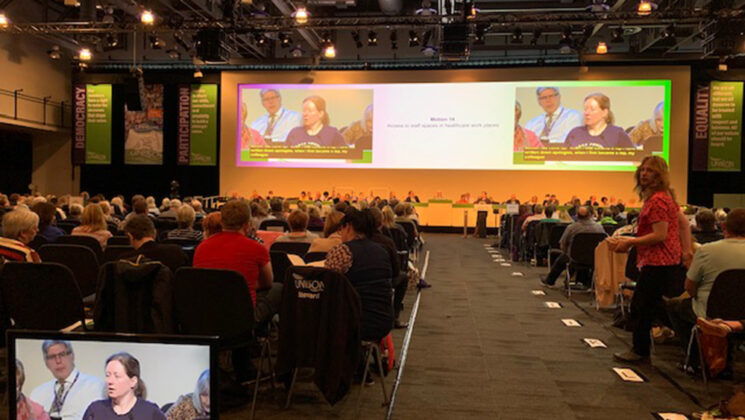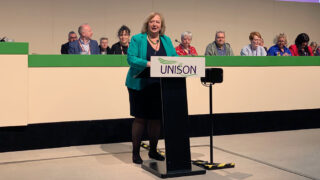The responsibility for the struggle facing the NHS was at the heart of the message in the first motion, when UNISON’s first in-person health conference since 2019 opened in Liverpool this morning.
And the gist of it was: “The blame lies with this government – not COVID.”
In the first of a series of motions on health, safety and wellbeing, Eddie Woolley for the service group executive told delegates that, in the 10 years leading up to the pandemic, “we have been shouting from the rooftops about the lack of investment … the government have done nothing.”
The health service now faced a situation where “winter pressures are all year round,” he said, adding that the problem was now so bad that NHS staff were leaving the service to work for private health staffing agencies, or private, non-health business, even Amazon.
Sue Highton reported that, in 46 years working in the NHS, she had “never seen the morale of staff so low”. The union needed to “fight and lobby, to recruit and retain”, she said.
Clare Miller observed: “We all know that lives have been lost because of understaffing.” She told of how her own mental health team in Manchester had won a dispute recently, after a 98% vote in favour of industrial action changed levels of staff confidence – and the attitudes of management toward them. “When we fight together, we can win”, she said.
Among a range of measures, conference agreed to call on the service group executive to:
- lobby government to address recruitment and retention and the “mass of vacancies” across all sectors of the NHS;
- work with regulators to manage the impact of the current workload on care and codes of conduct for health workers.
Mental health impact
A motion from the national young members’ forum stressed the negative impact of the pandemic on mental health, emphasising that it is a trade union issue, with the union’s LGBT+ group adding that this impact was increased for LGBT+ people, with trans and non-binary people particularly badly affected, as attacks on that group increase.
Ben Jackson from Greater Manchester mental health spoke of his shock at the decline in mental health during the pandemic, as managers want to “place more and more work on less and less staff,” with the managers themselves under huge stress to do their jobs.
“We had eight wards over new year with no nurses,” he reported, as an indicator of the crisis facing both staff and patients.
Andy McCain from Fermanagh, Northern Ireland, said: “We, as trade unionists, are often the first point of contact for staff facing mental issues”. He said that in 26 years he had never seen such levels of pressure and stress on colleagues.
“Don’t ever under-estimate the value of the rep in supporting somebody with mental health difficulties,” he said, while adding: “Remember your limitations and refer people. And look after your own mental health too.”
Pat Heron, for the service group executive, said that “chronic underfunding, excessive working hours and poor pay” were substantial contributors to the increasing problem in the service.
Calum Bell, a mental health nurse, stated that he had “lost count” of the number of colleagues who, over the six years since he qualified, had suffered, and the names of those who had ended their own lives.
Working in health is an occupational hazard for mental health, he told delegates, which needed constant attention.

Ambulance pressures
Jo Farrell for the ambulance occupational group talked of the problems caused by pressures on the service – and the impact not only on staff, but on the patients too, with situations where both may be stuck in an ambulance together, for 12 hours, as they wait at the hospital.
Turnover in control rooms is over 40% and sickness at an all-time high. “That’s without mentioning COVID”, she added, but was more the result of a decade of deliberate underfunding by the Conservatives in government.
Conference called on the executive to continue to raise concerns about the impact of pressures on staff mental health, and call for suitable funding to support staff and patients through the pandemic and beyond.
For the national disabled members committee, Susan Parkinson introduced a motion on long COVID, stressing the impact on NHS staffing.
“Some employers have been sympathetic,” she said, but this is not always the case, with others already instigating formal sickness and capability procedures, and even sacking staff.
“No one asked for COVID, but now they’re having to pay the price for it,” she said, adding that this was a particular issue for Black workers.
Speakers also stressed the need for long COVID to be understood as an occupational disease, since NHS workers were much more likely to face it than those not working in the service.
In a range of instructions to the executive, conference agreed that the union should:
- continue to produce guidance and training to help branches prevent members being penalised for having long COVID;
- promote union resources on reasonable adjustments, disability leave and bargaining to help support those with long COVID.
Rest spaces
For the national women’s committee, Karen Narramore emphasised the issue of a lack of changing and rest spaces for staff. The lack of spaces can also see a hierarchy, with non-medical support staff sometimes even worse served than medical staff.
Poor rest facilities can also lead to such problems as poorly ventilated facilities that are deeply uncomfortable for staff going through the menopause, while a lack of catering is an issue for those on shifts when catering facilities are closed.
Delegates repeatedly stressed that a substantial part of the problem is that many such elements of the service have been privatised and this must be reversed.
Conference called for the executive to work with the devolved nations to:
- establish standards for staff spaces in all healthcare environments;
- co-ordinate campaigns for the availability of hot food for staff who are working outside times that onsite catering is available.






